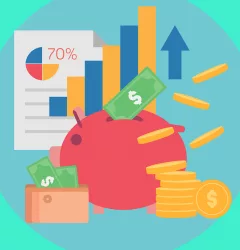20 Sep

|
Getting your Trinity Audio player ready...
|
Managing multiple debts can feel overwhelming, especially when juggling various due dates and interest rates. Debt consolidation loans offer a viable solution to simplify repayment and regain control over your finances. In this post, we’ll explore how debt consolidation can benefit you, the risks involved, and alternative strategies to ensure a brighter financial future.
Table of Contents
Understanding Debt Consolidation
Debt consolidation is a financial strategy that combines multiple debts into a single loan. This approach simplifies your repayment process by merging several debts, such as credit card balances, into one monthly installment. By doing so, you can focus on a single payment with a potentially lower interest rate.
Eligibility for debt consolidation varies depending on the lender and your financial situation. Typically, you’ll need a decent credit score, a stable income, and a manageable debt-to-income ratio. Various types of debts can be consolidated, including personal loans like those in Utah, medical bills, and high-interest credit card debts.
This strategy helps borrowers streamline their repayments, making it easier to manage due dates and reduce the risk of missing a payment. However, it’s essential to understand the mechanics and requirements of debt consolidation before proceeding.
Benefits of Debt Consolidation
One of the primary advantages of debt consolidation is the potential to secure lower interest rates. This reduction can lead to significant savings over time, as you’ll pay less in interest charges. Additionally, consolidating your debts often results in a lower monthly payment, making it easier to manage your budget.
Another benefit is the simplicity of having just one monthly payment. No more juggling various due dates or trying to keep track of which creditor you owe. This streamlined approach helps reduce stress and ensures you’re less likely to miss a payment, thus avoiding late fees.
Debt consolidation can also positively impact your credit score. By maintaining consistent, on-time payments and reducing your overall debt load, you demonstrate responsible credit usage, which may boost your score over time. This improvement can open the door to better borrowing opportunities in the future.
Risks and Considerations
While debt consolidation can be a helpful tool, it’s essential to be aware of the potential risks. One concern is the possibility of increasing your overall repayment amount. This situation may arise if you extend the loan term to achieve lower monthly payments, resulting in more interest paid over time.
Choosing the right consolidation method is crucial. Some options, such as balance transfer credit cards, may offer temporary relief but come with high interest rates once the introductory period ends. Carefully evaluate your options and consider seeking professional advice to find the best fit for your financial situation.
Keep in mind that debt consolidation can impact your credit score. Applying for a new loan may temporarily lower your score due to the hard inquiry. Additionally, closing old credit accounts can affect your credit utilization ratio. Be sure to weigh these factors before deciding on consolidation.
How to Apply and Qualify
Applying for a debt consolidation loan involves several steps. First, assess your financial situation and determine the total amount of debt you wish to consolidate. Next, research potential lenders and compare their terms, interest rates, and fees. Once you’ve selected a lender, gather your financial documents and submit an application.
Lenders consider various factors when evaluating your application, such as your credit score, income, and debt-to-income ratio. A strong credit history and stable income improve your chances of approval and help you secure favorable terms. Be prepared to provide documentation to support your application, such as pay stubs and tax returns.
It’s essential to review the loan terms carefully before committing. Pay close attention to interest rates, fees, and the overall repayment plan. Ensure that the loan aligns with your financial goals and provides a manageable path to becoming debt-free.
Alternative Debt Repayment Strategies
If debt consolidation isn’t the right fit, consider alternative strategies like the debt snowball and avalanche methods. The snowball method focuses on paying off the smallest debts first, while the avalanche approach targets high-interest debts. Both methods help you gradually eliminate debt and build momentum.
Credit counseling and debt management plans can also be effective. A credit counselor can help you create a budget and negotiate with creditors to reduce interest rates or waive fees. Debt management plans consolidate your payments into a single monthly installment, simplifying the repayment process.
In some cases, seeking professional financial advice is beneficial. A financial planner can help you evaluate your options and develop a personalized debt repayment strategy. Don’t hesitate to reach out for expert guidance if you’re struggling to manage your debts.
Conclusion
Now that you have a better understanding of debt consolidation, it’s time to decide if it’s the right option for you. Remember to carefully consider the benefits and risks and how they align with your financial goals. If debt consolidation isn’t feasible, explore alternative strategies and seek professional advice as needed to achieve a brighter financial future.


